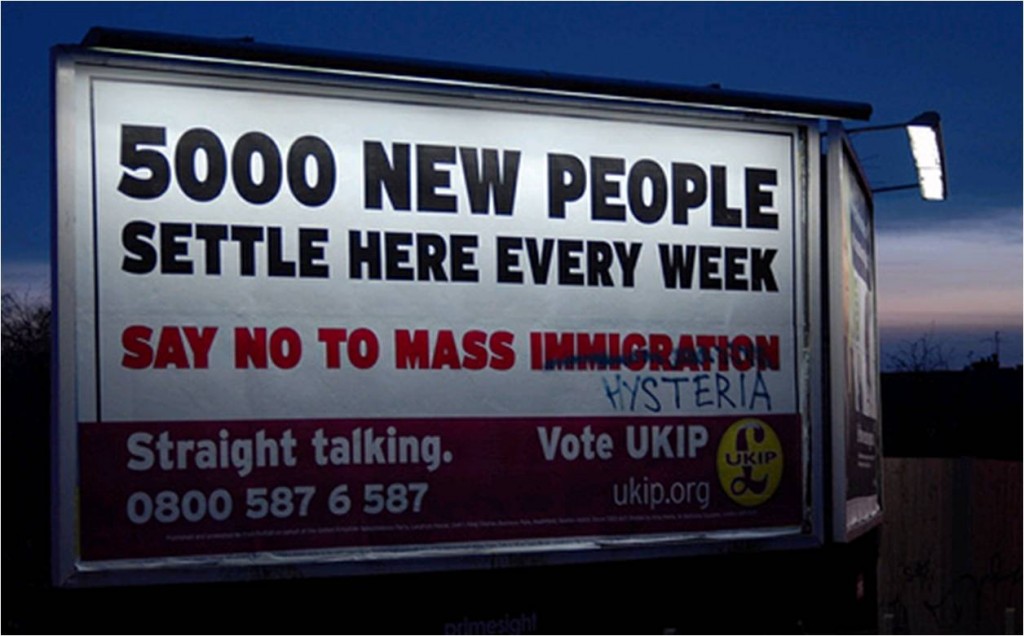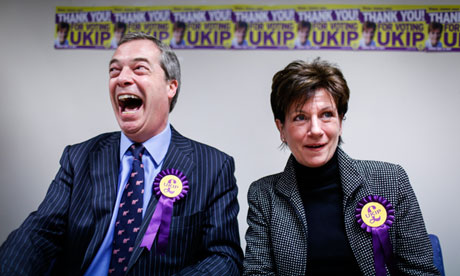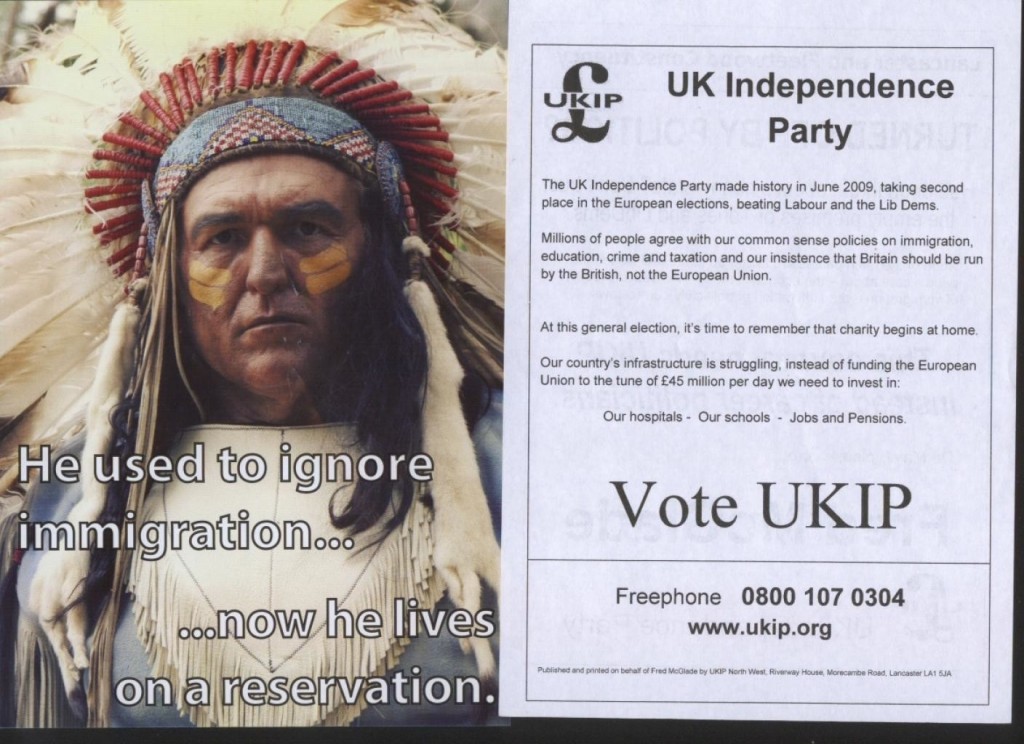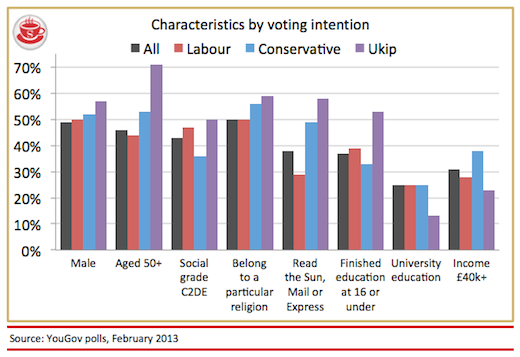Fear and Loathing in Great Britain – The UKIP Phenomenon
I had been planning to write an article about UKIP this week, aiming to explore their views; how they promote those views; why they have become more popular and the implication for British society. The murder of Lee Rigby in Woolwich this week by two men claiming to be working on behalf of Islam has dominated the national news headlines for days and it made me think twice about whether I should go ahead with my article right now. Emotions are running high. It is easy for well-intentioned words to be taken the wrong way and although I am not afraid to challenge ideas and beliefs I disagree with, I am also not keen to cause offence because I believe people’s rights to believe whatever they want should be respected even if the beliefs themselves deserve little or no respect. On careful reflection, I think that despite the possible pitfalls it is actually even more important to tackle the UKIP situation head on right now.
I would from the outset like to make it absolutely clear that I understand UKIP are not the BNP (a straightforwardly racist political party) and they are not the EDL (an unthinking bunch of bigots formed because some football hooligans needed another hatred outlet). We are continuing to see worrying evidence of elected UKIP Councillors that hold views not too far removed from the BNP or the EDL but generally speaking, UKIP are much more clever and much more sophisticated. Their relevance to the attack in Woolwich is that the backlash has resulted in a marked rise in nationalistic sentiment from many people in the UK and UKIP campaign on a platform of anti-immigration and anti-European Union policies. They emphasise the positives of Britishness and the negatives of foreigners and these issues go right to the heart of the debate sparked in the aftermath of the murder. This article is meant to be about UKIP so I will not directly say any more about the murder of Lee Rigby other than to express my deepest sympathy for him, his family and friends and anybody unfortunate enough to have witnessed it happen. It was an appalling crime, beyond the comprehension of anybody with any sense of right and wrong. Thinking about the act itself makes me angry and sad in equal measure but we must nevertheless look to understand what happened and why: the psychological reasons, the social reasons, the political reasons and the religious reasons. They all matter and we must look, listen and learn from the tragedy.
So, back to UKIP.
Why UKIP have gained popularity
1) Economic times are hard. Many people are struggling to find work or keep work and even those that do are being hit hard by inflation that pushes up prices but not wages.
2) There is widespread disillusionment with politics and politicians. Many people have genuine reasons to be angry with Labour and they also have genuine reasons to be angry with the Tories. In the past those people fed up with the Labour/Tory merry-go-round were able to vote for the Liberal Democrats as a form of protest. But now the Lib Dems have become a party with a degree of real power and many people also have genuine reasons to be angry with them.
3) The huge ongoing problems of the Euro currency and the economic / political fallout from that.
People are frustrated and as seems to be a common trait, they start to romanticise the past and believe that things were better back then, rather than just different. There is a desire to seek comfort in getting back to the “good old days”. In hard times, people become more introverted, less able to see or care about the bigger picture because they are pre-occupied with the very real personal problems they are faced with day in day out. Change is scary. We are becoming more multi-racial, more multi-national, more accepting of minority groups. No-one is sure how this will end up.
And as if by magic, out of the nostalgic smoke, rises the UK Independent Party, championing old-fashioned values led by self-styled man of the people Nigel Farage.
The strange thing about their recent rise is that they have been on the fringes of UK politics for 20 years but until recently no-one took them seriously. Their central policy of Britain leaving the European Union was never remotely credible. They were generally dismissed as a xenophobic inward looking party that believed if you could just stop the influence of foreigners in our society, it would make things better. They still have those views but for the reasons outlined above the views do not seem quite so ridiculous to quite so many people right now.
UKIP on Immigration
On the issue of immigration, they unsubtly utilise that age old political manipulator, fear.
The more afraid you are of the changing world > the more likely you are to seek comfort in the “good old days” mentality > the more likely you are to shun progressive change > the more likely you are to vote UKIP. They provide a romantic illusion of a better world in days gone by that never really existed.
Now, the clever part, the really clever part, is that this way of thinking sort of (SORT OF) makes sense. It sort of makes sense because if people think in this way it becomes a self-fulfilling prophecy. This is how it works: if you are afraid of a particular group of people or type of person you will behave towards a person from that group in a defensive manner because you don’t trust them. That is human nature. If you behave in a guarded and defensive manner towards someone just because they belong to a certain group then the individual on the other end of that behaviour will find it harder to interact with you positively and will begin to form prejudices of their own, which will make them behave more negatively towards you and thereby reinforce the original perception you had. Your original reaction (fear and mistrust) has been affirmed as correct and you will therefore believe you were right to make the judgment in the first place.
There you have it – a stereotype and a fully formed negative cycle to perpetuate the stereotype. Both you and the other person believe you are justified in your judgments and can back up your view with personal evidence. This is how bias and prejudice work. We all do it, conscious or not, but that does not make it logically or morally right. We perhaps can’t stop our brains seeking patterns and simplifying data to make initial judgments but we do have a moral duty to rationalise this process, recognise it and educate ourselves to make sure we do not act on it.
The overwhelming majority of objective studies have concluded that immigrants to the UK:
a) Largely come here to work.
b) Contribute more money in tax than they take out in benefits.
c) Are good for the UK economy.
d) Are less likely to commit crime than your average Brit.
e) Are less likely to fraudulently claim benefits than your average Brit.
These are the facts and the evidence and if we are going to behave rationally then weighing up the facts and evidence are how we should make judgments. Think about these facts and then read a UKIP campaign leaflet trying to scare people into believing the Bulgarians and the Romanians are going to come here in their millions. When you do this you start to see the cynical way in which they succeed by promoting unfounded fear.
UKIP on the European Union
The EU situation is more complicated than immigration but the UKIP principles remain the same, namely play on the fears and frustrations, magnify them out of proportion and twist the facts. The EU is just another scapegoat to lash out at during hard times. They are the faceless villains that can’t answer back.
I will give you a small example of the frenzy certain people have been whipped into on the EU by UKIP and the supporting media (mainly the tabloids, who by the way also work on a simplistic hyperbolic logic, it is no wonder they love Farage). I was listening to a music radio station recently and the presenter started going into a mini-rant on a news story about how the EU have not given blue flag status to certain British beaches and how we need to have an EU referendum as soon as possible. What?? It is amazing the arguments people can use:
Silly EU – they won’t let us bathe in our own dirty sea-water (it may be dirt but by Jove it’s good old fashioned British dirt!)
Silly EU – stopping us from formally lifting an arms embargo to rebels in Syria who have no clear agenda and may well have been responsible for using chemical weapons.
Silly EU – enforcing health and safety regulations that annoy employers but save lives.
Silly EU – not letting us ignore our own human rights laws formed after the bloodbath of World War 2 because the UK apparently doesn’t believe that human rights apply to all humans despite the clue in the name.
Silly EU – allowing us to negotiate enormous international trade deals that stem from the power created by being part of the largest single market in the world.
Silly EU – giving us a political clout and influence that we would not otherwise have, allowing us to retain at least a small separation from American foreign policy and giving us a better chance to actually try to influence this world for the better.
Silly EU – helping to provide a reliable framework of co-operation and stability in a continent that has been at the epicentre of two of the deadliest conflicts in human history.
No doubt there are some legitimate downsides to the EU, hence me saying it is more complicated than the immigration debate. It does create bureaucracy and it compromises our absolute national autonomy in certain areas but quite frankly compared to the benefits, so what? What is so great about absolute national autonomy? We are meant to behave in accordance with international laws but nobody is suggesting we leave the United Nations. Rules will never be popular and some of them might be unnecessary but overall they are vitally important in minimising corruption and maximising transparency within our legal and political frameworks.
The truth is that no-one knows for sure the economic effect of leaving the EU but I am prepared to back the judgment of the vast majority of politically independent economists who say it will be anywhere between damaging and a disaster. The economic argument from UKIP is a smokescreen. Their desire to leave the EU is ultimately driven by an irrational dislike and mistrust of all things foreign.
Don’t vote UKIP
Divides along national lines are to an extent a fact of life but it is easy to see that beliefs based on national difference are often arbitrary. Everyone in every country has a tendency towards believing certain things because of where they were born and brought up. If our personal beliefs can be so largely affected by our country of birth then we are wrong to stick with those beliefs purely on the basis of our nationality. Nations are there for a purpose: to make administration practical and to create the sense of unity, belonging and identity that human beings naturally crave. These are all good reasons to be patriotic but to become nationalistic is to take this too far and lose perspective. Human beings are fundamentally the same everywhere. Do we really, honestly consider ourselves as people better than the French, the Germans, the Polish, the Somalis or the Iranians or do we acknowledge the truth that had we been born in any of those countries we too would have shared national cultural traits? It is right to debate which things different nations have got right but the differences between the people themselves are based purely on history and culture, not in morality.
I have no wish to see a completely homogenised world where everyone thinks the same and everyone acts the same. That would be pretty boring and with so many different viewpoints on so many subjects it would never happen anyway. But surely it would be a better world if we were more open to sharing ideas and changing attitudes in a mutually beneficial way. The world continues to move inevitably in this direction and the internet has only speeded up the process. It is going to happen and the more the UK fights it the harder it will be to become the happy prosperous nation we would all like to see. I find not being judgmental the hardest thing to do but I know that the hatred in the world would be diminished if more people were more empathetic and understanding so I will strive to act in that way. When I fail I will check myself and try again. Each of us can only do our part and encourage others to do the same.
The UKIP way is not progress. It is a desire to regress. That may be appealing to some people but I would rather face reality, challenge my own fears and perceptions and try to make a positive difference in the time I have on this earth. Each of us has a choice. We don’t have to be driven by fear, even though we will often be afraid. We can choose compassion and understanding instead. I am going to.
MORE POLITICS:
MONGOLIAN PRESIDENT IS A GOOD GUY
TURKMENISTAN’S STRANGEST DICTATOR
TORONTO’S MAYOR EMBARRASSING HIMSELF
CONSERVATIVE MP EMBARRASSING HIMSELF





















